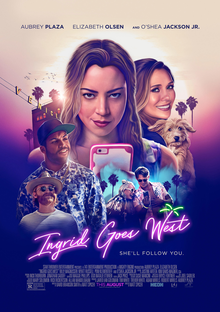Ingrid Goes West
Black humor is hard, because walking the thin line between funny and mordant is precarious. Some films end up being too silly, and others tilt the way of mawkish. Ingrid Goes West almost falls off on the side of mawkishness, but manages to be a poignant commentary on the role of social media in the lives of the lonely.
Aubrey Plaza stars as someone we don't know too much about, other than that she is prone to stalking. The film opens with her crashing the wedding of an acquaintance and getting institutionalized. Her mother has recently died, and we get the impression she was her only companion. But then she discovers one of those new breeds of celebrity I have a hard time understanding--the social media celebrity, who gathers followers and then gets paid by companies to praise their brands.
This is Elizabeth Olsen (the second film I've seen with her in a week) and she impresses Plaza with her exquisite taste, whether it's food, clothing, decorating, or books. With the money her mother left her, she decides to move to Venice Beach, California and befriend Olsen.
She starts with the dubious plan of kidnapping her dog and returning it, which works. Plaza and Olsen strike up a friendship (also with Olsen's husband, a hipster with a man-bun played well by Wyatt Russell), and she also develops an attraction with her neighbor, O'Shea Jackson Jr. What's interesting about Plaza's character is that when she feels as if she's liked and appreciated she behaves perfectly normally. It's only when her friendship is threatened, as it is by the arrival of Olsen's loutish brother, than she starts getting crazy.
The film was directed by Matt Spicer and co-written by Spicer and David Branson Smith. I found the script's insight into social media and our nation's craze for our phones to be spot-on. "Where's my phone?" is the first thing that Plaza says upon awakening in a hospital bed. She spends her days and nights going through Instagram, robotically clicking "heart" on all the pictures. She appears to have no inner life, only a need to be attached to those she sees on her phone. She's like the technologically advanced Eleanor Rigby.
One is left with questions. Was she employed? Was she able to function in society? The script could have rounded her out a tad more. Otherwise, this film is as sharp about social media addiction as The Lost Weekend was about alcoholism. It's just another way to fill our lonely lives.
Aubrey Plaza stars as someone we don't know too much about, other than that she is prone to stalking. The film opens with her crashing the wedding of an acquaintance and getting institutionalized. Her mother has recently died, and we get the impression she was her only companion. But then she discovers one of those new breeds of celebrity I have a hard time understanding--the social media celebrity, who gathers followers and then gets paid by companies to praise their brands.
This is Elizabeth Olsen (the second film I've seen with her in a week) and she impresses Plaza with her exquisite taste, whether it's food, clothing, decorating, or books. With the money her mother left her, she decides to move to Venice Beach, California and befriend Olsen.
She starts with the dubious plan of kidnapping her dog and returning it, which works. Plaza and Olsen strike up a friendship (also with Olsen's husband, a hipster with a man-bun played well by Wyatt Russell), and she also develops an attraction with her neighbor, O'Shea Jackson Jr. What's interesting about Plaza's character is that when she feels as if she's liked and appreciated she behaves perfectly normally. It's only when her friendship is threatened, as it is by the arrival of Olsen's loutish brother, than she starts getting crazy.
The film was directed by Matt Spicer and co-written by Spicer and David Branson Smith. I found the script's insight into social media and our nation's craze for our phones to be spot-on. "Where's my phone?" is the first thing that Plaza says upon awakening in a hospital bed. She spends her days and nights going through Instagram, robotically clicking "heart" on all the pictures. She appears to have no inner life, only a need to be attached to those she sees on her phone. She's like the technologically advanced Eleanor Rigby.
One is left with questions. Was she employed? Was she able to function in society? The script could have rounded her out a tad more. Otherwise, this film is as sharp about social media addiction as The Lost Weekend was about alcoholism. It's just another way to fill our lonely lives.



Comments
Post a Comment